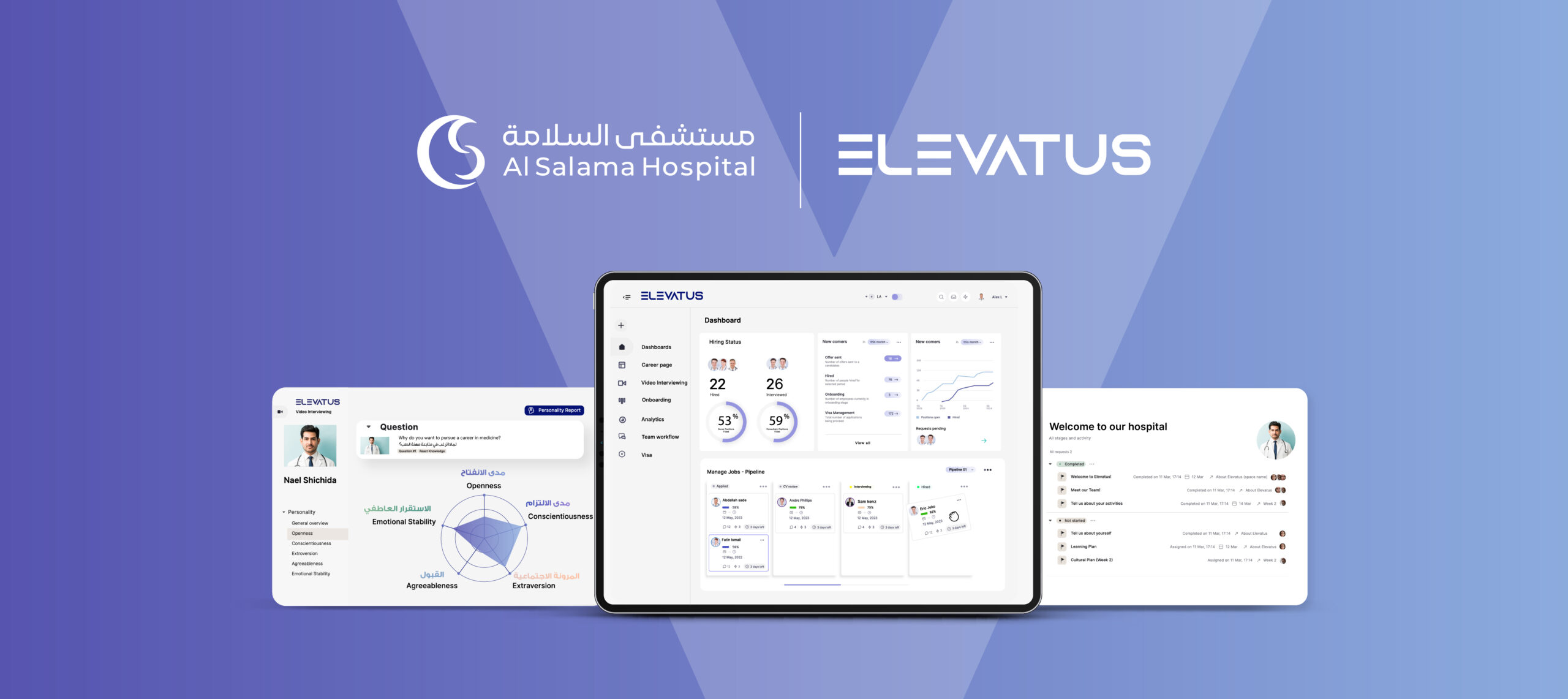
Video Interviewing Software
Elevating Your Hiring Game: 5 Ways Self-Recorded Video Interviews Can Help You Hire Better
April 6, 2023
Reem Al-Tamimi
Content Writer
Have you ever wondered why your interviewing process is so time-consuming? Even when you put in your best efforts – you still find that it’s taking a huge chunk of your time. And just when you think you’ve got the hiring process down pat, another hiccup appears. But fear not! Self-recorded video interviews have come into play and will help you elevate your hiring game.
Would you have believed it a year ago if someone told you that self-recorded video interviews would be the key to your hiring success? Probably not! Through these video interviews, you can interview a large number of candidates remotely and seamlessly – and shave off hours of recruiting time.
Self-recorded video interviews are not just a cool tool to have in your recruitment toolkit – they’re much more than that if you leverage the right one. In this blog, we’ll look at self-recorded video interviewing and 7 ways it optimizes and improve your hiring process.
What are self-recorded video interviews?
Self-recorded video interviews are an initial screening technique that is a popular tool used by employers. It’s also known as asynchronous interviews. It helps recruiters to evaluate if the candidate possesses the prowess to progress to the next stage of the interview process.
But here’s the unique twist: instead of engaging in a dialogue with a person, you’ll be facing written questions that will appear on your computer screen.
The best part? Recruiters can review these recorded videos and evaluate them at the most convenient time for them. This way, the interviewing process is easier for both the candidate and the recruiter.
Self-recorded interviews have become a common feature of the recruitment process, and their popularity has grown significantly, particularly during the pandemic. This trend is expected to continue even after the pandemic has subsided. A Gartner HR survey found that virtual interviews were used by 86% of organizations to evaluate candidates during the COVID-19 outbreak.
Following the pandemic, companies realized that self-recorded interviews are more than just a trend – they are the key to hiring success. Ultimately, these video interviews have reduced the time it takes to hire. It’s also less costly in terms of travel and time commitments for both the candidate and the recruiter.
5 benefits of self-recorded video interviews
Self-recorded video interviews have numerous advantages for both candidates and employers alike. It’s a fantastic tool for thoroughly evaluating candidates. This is especially true for remote jobs that demand face-to-face interviews with clients and potential employees.
Are you on the fence about utilizing self-recorded video interviews?
Here are 5 compelling benefits that self-recorded video interviews provide for recruiters.


Build a great candidate experience
As the saying goes, “Once bitten, twice shy.” As a recruiter, keep in mind that if your candidate has poor candidate experience, they will most likely drop out of the hiring process faster than the blink of an eye.
But here’s the good news: with self-recorded video interviews, you can quickly turn the tables and guarantee a fantastic candidate experience.
Due to schedule conflicts, both the candidate and the recruiter may find it challenging to schedule an interview. Your candidate might lose interest if you wait too long to schedule an interview. However, with self-recorded video interviews, candidates can easily respond to your questions in their own time and from the comfort of their own homes.
Self-recorded interviews also give the candidates a chance to stand out. You can seamlessly keep candidates on their toes and engaged all throughout! This way, they will sail through the application process in a productive, enthusiastic, and motivated manner. Overall, this will increase the candidate’s level of interaction during the application process and enhance the candidate’s experience monumentally.
Save your valuable time
Are you aware that the hiring process takes 45 days? That’s more than a month! Luckily, you don’t have to waste any more time or money on a dreadfully long hiring process!
Instead of interviewing the old-fashion way, spruce things up and use self-recorded video interviews. Did you know that you can assess 10 self-recorded video interviews in the same time it would take to assess only one traditional interview? Talk about being time efficient!
Overall, recruiters can screen candidates faster, allowing them to swiftly eliminate unqualified candidates without even breaking a sweat – or second-guessing their decision! This way, recruiters can concentrate on moving the best candidates forward to the next stage without the hassle.
Make your hiring process cost-effective
Managing your recruitment budget can be just as complex as solving a 500-piece puzzle – if you don’t plan it right, you’ll lose the pieces. A lengthy hiring process, high travelling costs, and weak team collaboration can all take away a huge chunk of the puzzle.
For example, recruiters who still use traditional hiring methods take a long time to fill a position. They can be overwhelmed by an enormous and unnecessary manual workload. This includes a huge amount of time spent reviewing resumes and making numerous phone calls. All of this hassle just to determine which candidates should be invited for in-person interviews!


In addition, if companies are looking for the best talent worldwide and decide to meet with the candidates in person, they might have to cover all travel expenses. Not to forget, it’s no walk in the park to accurately predict a candidate’s true potential until recruiters have met them and evaluated them in person!
But how to find the right candidate in a faster and more affordable way?
Initial screening is one of the most critical stages of the hiring process. However, recruiters who screen candidates over the phone typically spend 30 minutes interviewing each candidate.
This is where self-recorded video interviews come to the rescue. Not only can it help improve the recruitment process, but it allows you to consume less time and make your process more cost-efficient.
Get a better understanding of your candidates
What is your first move as a recruiter during the initial screening process? Do you make phone calls to your candidates? How much insight do you gain from that one single phone call?
Probably not much!
Instead, recruiters can use self-recorded video interviews to glean better insights into how candidates communicate and whether or not they’re culturally fit. In fact, you can even leave out more about their personality traits from their body language! The phone?
Another way self-recorded interviews can help you understand your candidates and improve your hiring decisions is through collaboration. Unlike phone interviews, self-recorded video interviews allow recruiters to collaborate easily. Where they can share the video interviews with other hiring team members. Plus, each team member can easily watch the candidates’ videos on their own time and leave feedback at their convenience. This way, all the team members can collaborate seamlessly and move the best candidates forward!
Give a boost to your employer’s branding
Employer branding is more than just your mission and vision statements. It’s more of a primary tool for communicating with your targeted talent pool. When it comes to potential employees, you need to show them why they should join your company. But you’re probably wondering what all of this has to do with self-recorded video interviews.
Offering a seamless and hassle-free interview process can have a positive impact on both your candidate experience and your overall company reputation. However, the benefits do not end there. Each stage of the self-recorded interview process can contribute to improved employer branding.


Take, for instance, the introduction video for your interviews. You can leverage it to explain the importance of self-recorded video interviews in your hiring process and showcase your company’s unique personality. Instead of relying solely on what is said during the interview, this video can provide candidates with an honest overview of your company, demonstrating your commitment to their needs and showcasing your professionalism and preparedness throughout the hiring process.
Wrapping up
Now that you have a clear understanding of the benefits of self-recorded video interviews, it’s clear that they can be a game-changer for your hiring process. Not only do they save time and money, but they also improve the candidate experience and employer branding and help make better hiring decisions.
In fact, the widespread adoption of this advanced technology has enabled many companies globally to match exceptional candidates with their ideal roles. It’s no wonder that self-recorded interviews have become an essential tool for any company striving to enhance its hiring process.
Turn top talent to employees fast
Hire, assess, onboard and manage top talent for every job. See how Elevatus streamlines everything; from acquire to new hire.
Request a demoAuthor
Reem Al-Tamimi
Don't miss a thing!
Stay one step ahead. Subscribe and get the latest updates, news, and insights from Elevatus straight to your inbox.







